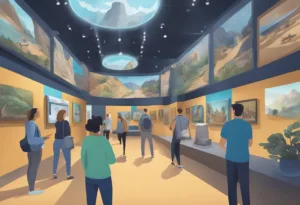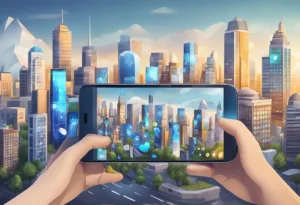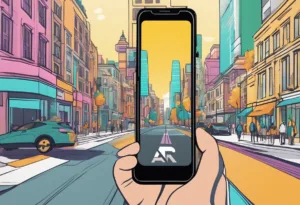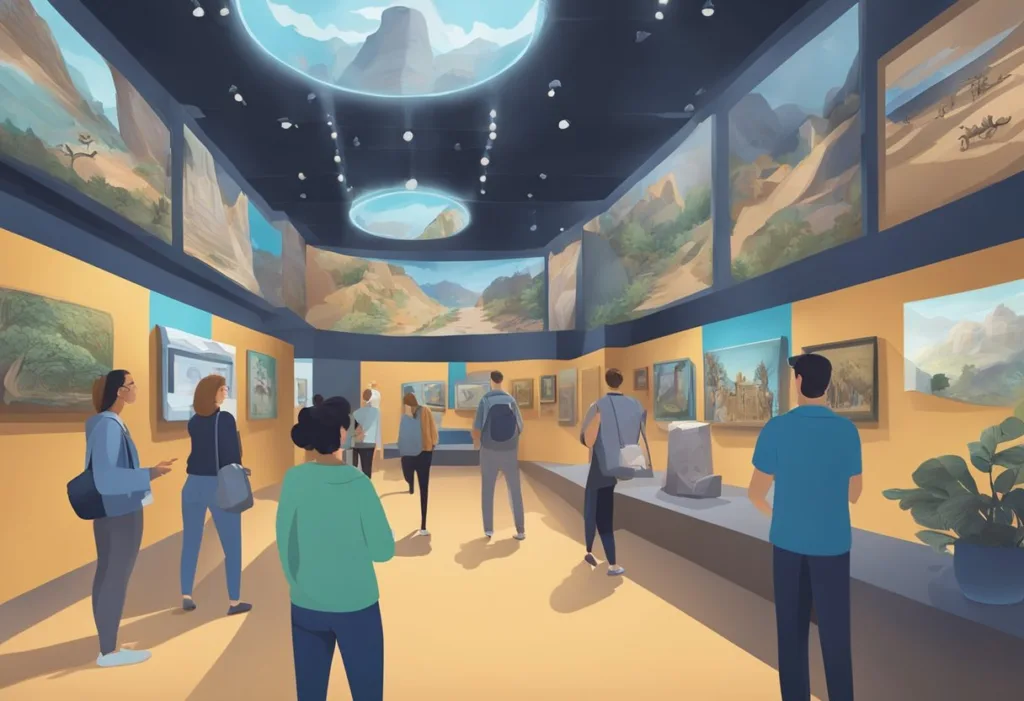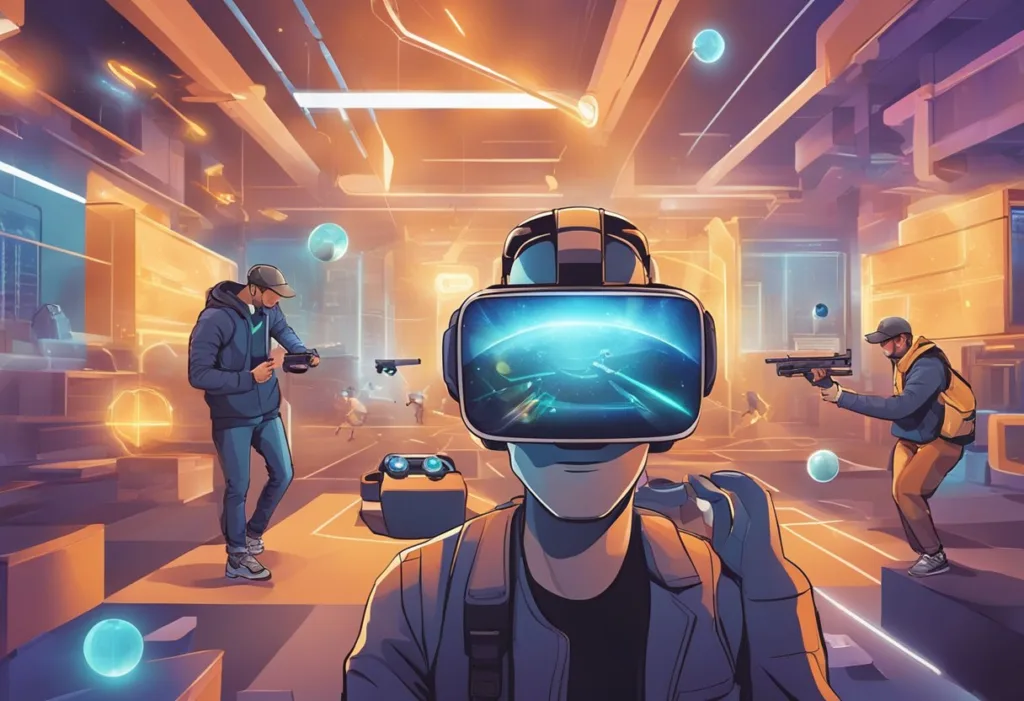Metaverse tourism is a relatively new concept that has emerged in recent years due to the growing popularity of virtual reality technologies. The metaverse is a term used to describe a virtual world where users can interact with each other and the environment in a highly immersive way. This technology has the potential to revolutionize the tourism industry by allowing people to experience destinations and activities in a completely new and innovative way.
Virtual reality technologies have been around for several decades, but it is only in recent years that they have become more accessible and affordable for the general public. The metaverse is the latest development in this field, offering a more complete and immersive experience that goes beyond what traditional virtual reality can offer. With the metaverse, users can explore virtual worlds that are incredibly detailed and realistic, allowing them to feel as if they are actually there. This technology has the potential to completely transform the way people travel and experience new destinations, offering a more convenient and cost-effective alternative to traditional tourism.
Evolution of Metaverse Tourism
Historical Context
The concept of Metaverse has been around since the publication of Neal Stephenson’s novel, Snow Crash, in 1992. The term was used to describe a virtual world where people could interact with each other in a 3D environment. Since then, the idea of Metaverse has evolved, and it is now seen as a collective space where physical and digital worlds converge to deliver more immersive, interactive virtual or augmented reality user experiences.
Technological Advancements
The rise of the internet and advancements in technology have played a significant role in the development of Metaverse tourism. The development of high-speed internet and the availability of affordable VR and AR devices have made it possible for people to experience Metaverse tourism from the comfort of their homes.
The development of blockchain technology has made it possible to create decentralized Metaverse environments that are more secure and transparent.
Rise of Virtual Tourism
Virtual tourism has become increasingly popular in recent years, and the COVID-19 pandemic has accelerated its growth. With travel restrictions in place, people have turned to virtual tourism as a way to experience different destinations without leaving their homes.
Virtual tourism allows people to explore different destinations, learn about their history and culture, and interact with locals, all from the comfort of their homes.
In conclusion, the evolution of Metaverse tourism has been driven by advancements in technology and the rise of virtual tourism. The concept of Metaverse has evolved from a virtual world to a collective space where physical and digital worlds converge to deliver more immersive, interactive virtual or augmented reality user experiences. With the continued development of technology, it is expected that Metaverse tourism will continue to grow in popularity.

Metaverse Tourism Ecosystem
Virtual Ecosystem Components
Metaverse tourism is a virtual ecosystem that is made up of various components. These components include the environment, which is the virtual space where tourists interact with the metaverse. The environment is designed to be interactive and immersive, with realistic 3D graphics and sound effects. The environment can be customized to suit the needs of different types of tourists, such as adventure seekers, cultural enthusiasts, and relaxation seekers.
Another component of the metaverse tourism ecosystem is interaction. Tourists can interact with the environment and other tourists in various ways, such as through avatars, chat rooms, and virtual tours. The interaction is designed to be seamless and intuitive, with easy-to-use interfaces and controls.
Stakeholders and Value Co-Creation
The metaverse tourism ecosystem is created through the collaboration of various stakeholders. These stakeholders include tourism operators, technology providers, investors, and regulators. Each stakeholder plays a critical role in the creation and maintenance of the ecosystem.
Value co-creation is an essential aspect of the metaverse tourism ecosystem. Value co-creation involves the collaboration of various stakeholders to create value for tourists.
This value can be in the form of immersive experiences, personalized services, and innovative products. Value co-creation is achieved through the integration of various technologies, such as blockchain, artificial intelligence, and virtual reality.
Business Models and Investment
The metaverse tourism ecosystem is supported by various business models and investment strategies. These models and strategies include pay-per-use, subscription-based, and freemium models. The investment strategies include venture capital, crowdfunding, and initial coin offerings (ICOs).
The business models and investment strategies are designed to provide sustainable revenue streams for the stakeholders and to ensure the long-term viability of the ecosystem. The models and strategies are also designed to be flexible and adaptable to changing market conditions.
The metaverse tourism ecosystem is a complex and dynamic virtual ecosystem that is created through the collaboration of various stakeholders. The ecosystem is designed to provide immersive and personalized experiences for tourists, while also ensuring sustainable revenue streams for the stakeholders.
The ecosystem is supported by various technologies, business models, and investment strategies, which are designed to be flexible and adaptable to changing market conditions.
User Experience in Metaverse Tourism

The concept of the metaverse has the potential to revolutionize the tourism industry. It offers a unique opportunity to create immersive experiences that can transport users to different destinations, allowing them to explore new places and cultures without leaving their homes. The user experience in metaverse tourism is a critical aspect that can make or break the success of a virtual tourism experience.
Immersive Technologies
The use of immersive technologies such as virtual reality headsets and augmented reality can enhance the user experience in metaverse tourism.
These technologies can create a sense of presence, making users feel as if they are actually in the destination they are exploring. The use of haptic feedback and other sensory cues can further enhance the immersive experience.
Customer Journey
The customer journey in metaverse tourism is similar to that of traditional tourism. However, the user experience in metaverse tourism is more personalized and interactive. Users can choose their own adventure, exploring different areas of the destination at their own pace.
They can interact with other users and even locals to gain a deeper understanding of the culture and history of the destination.
Personalization and Avatars
Personalization and avatars are critical aspects of the user experience in metaverse tourism. Users can create their own avatars, which can be customized to reflect their personality and preferences. The use of artificial intelligence and machine learning can further personalize the experience, making recommendations based on the user’s interests and preferences.
The user experience in metaverse tourism is a critical aspect that can make or break the success of a virtual tourism experience. The use of immersive technologies, personalization, and avatars can enhance the user experience, creating a sense of presence and allowing users to explore new destinations in a personalized and interactive way.
Cultural and Sustainable Impacts
Preserving Cultural Heritage
Metaverse tourism has the potential to preserve cultural heritage by creating virtual replicas of historical sites and monuments. This approach can help to conserve the cultural identity of a place and prevent damage caused by excessive tourism.
For instance, the Great Wall of China, which is a UNESCO World Heritage site, has suffered from overcrowding and damage due to tourism. By creating virtual replicas of such sites, tourists can experience them without causing harm to the original structures.
Sustainable Tourism Practices
Metaverse tourism can also contribute to sustainable tourism practices. It can provide an opportunity to promote sustainable tourism practices by educating tourists on how to reduce their carbon footprint and minimize their impact on the environment. Metaverse tourism can help to reduce the need for physical travel, which is a major contributor to greenhouse gas emissions.
Smart tourism cities can also benefit from metaverse tourism. By integrating metaverse technology into their tourism offerings, smart tourism cities can provide tourists with a more personalized and immersive experience while reducing the environmental impact of tourism.
For instance, a smart tourism city can create a virtual tour of its attractions, allowing tourists to experience the city without physically traveling to the location.
Metaverse tourism has the potential to promote sustainable tourism practices and preserve cultural heritage. By creating virtual replicas of historical sites and monuments, metaverse tourism can help to conserve the cultural identity of a place and prevent damage caused by excessive tourism.
Metaverse tourism can educate tourists on how to reduce their carbon footprint and minimize their impact on the environment. Smart tourism cities can also benefit from metaverse tourism by providing tourists with a more personalized and immersive experience while reducing the environmental impact of tourism.

Challenges and Future Outlook
Security and Ethical Concerns
As with any new technology, the metaverse comes with its own set of security and ethical concerns. One of the biggest challenges is ensuring the privacy and security of users’ personal data.
As the metaverse grows and becomes more integrated with our daily lives, the potential for data breaches and cyber attacks increases. It is important for companies and developers to prioritize security measures to protect users’ sensitive information.
Another ethical concern is the potential for addiction and the impact on mental health. The immersive nature of the metaverse can be both a blessing and a curse.
While it offers new opportunities for connection and entertainment, it can also lead to social isolation and addiction. It is crucial for researchers and developers to study the effects of the metaverse on mental health and implement measures to mitigate any negative impacts.
Future Research Directions
Despite the challenges, the metaverse presents many opportunities for the tourism industry. As the technology continues to evolve, there is a need for further research to explore its potential applications in the field. One area of research is the development of immersive experiences that can simulate real-world travel. This could allow people to explore new destinations and cultures without leaving their homes.
Another area of research is the impact of the metaverse on the tourism industry as a whole. As the technology develops, it has the potential to disrupt traditional tourism models and create new opportunities for businesses. Researchers need to explore how the metaverse can be used to enhance the tourism experience and create new revenue streams.
The metaverse presents both challenges and opportunities for the tourism industry. While there are security and ethical concerns that need to be addressed, there is also great potential for the development of immersive travel experiences and new business models. Continued research and development are necessary to fully understand the impact of the metaverse on the tourism industry and to ensure its responsible and sustainable use in the future.
Frequently Asked Questions
What are some notable examples of tourism experiences in the metaverse?
The metaverse offers a wide range of tourism experiences, from virtual city tours to immersive cultural experiences. Users can explore different worlds, interact with other users, and participate in various activities such as attending concerts, visiting museums, and even attending virtual conferences.
Which companies are pioneering metaverse tourism?
Several companies are actively involved in pioneering metaverse tourism. These include major players such as Facebook, Microsoft, and Google, as well as smaller startups such as Decentraland and Somnium Space. These companies are developing platforms and tools that enable users to create and explore virtual worlds.
What strategies are being implemented for successful metaverse tourism?
To ensure successful metaverse tourism, companies are implementing various strategies such as creating engaging and immersive experiences, collaborating with other companies and content creators, and leveraging social media and influencer marketing. Companies are focusing on creating sustainable and inclusive experiences that cater to a diverse range of users.
What platforms are available for exploring metaverse tourism?
There are several platforms available for exploring metaverse tourism, including Decentraland, Somnium Space, Second Life, and VRChat. Each platform offers unique features and experiences, and users can choose the platform that best suits their interests.
How can metaverse tourism contribute to sustainable tourism development?
Metaverse tourism has the potential to contribute to sustainable tourism development by reducing the environmental impact of traditional tourism.
Virtual tourism experiences can help to reduce carbon emissions associated with travel, while still providing users with engaging and immersive experiences. Metaverse tourism can help to promote cultural exchange and understanding, which can contribute to sustainable development.
In what ways is metaverse tourism impacting the hotel and hospitality industry?
Metaverse tourism is still in its early stages, and its impact on the hotel and hospitality industry is not yet fully understood. However, some experts predict that metaverse tourism could disrupt the industry by providing users with alternative accommodation options and reducing the need for physical hotels. Hotels and hospitality companies may need to adapt to the changing needs of users who are increasingly seeking immersive and engaging experiences.



